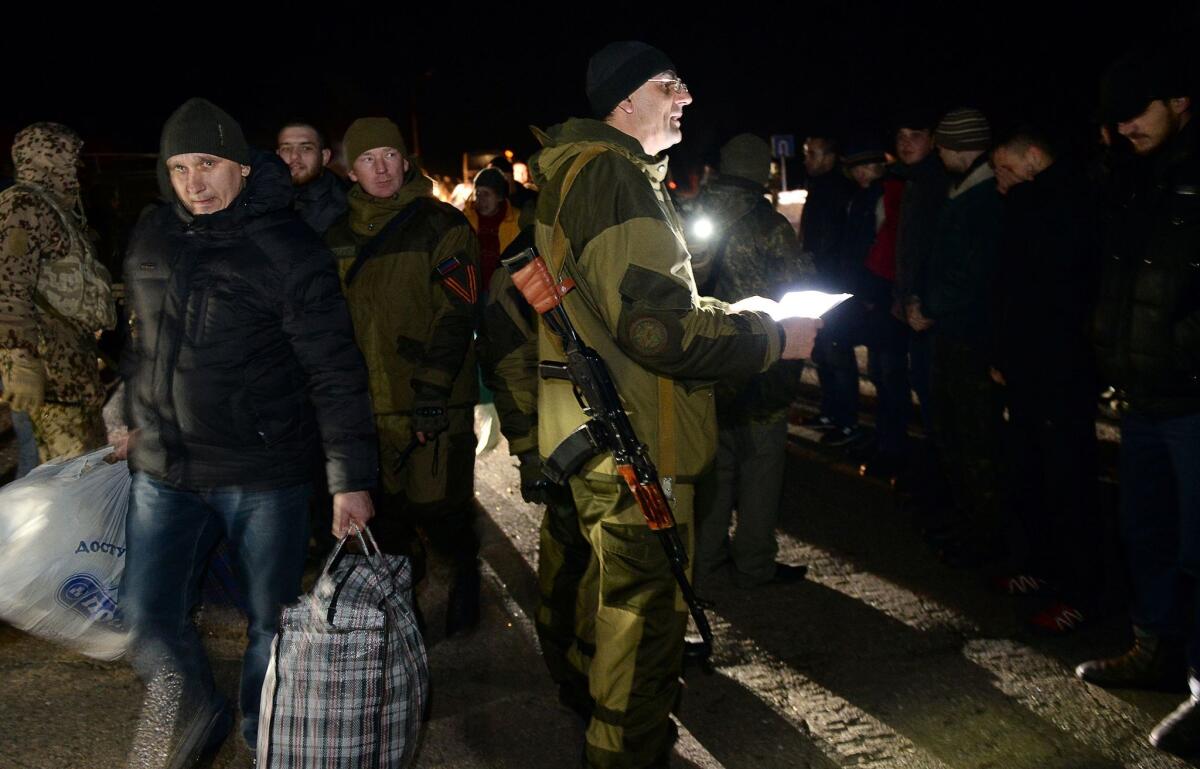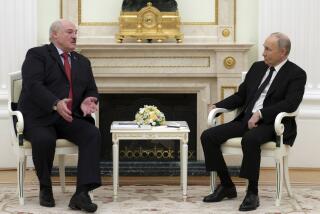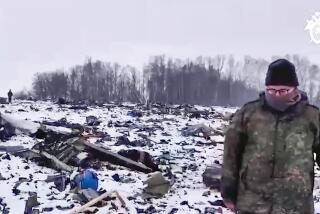Ukraine, separatists exchange prisoners after latest talks break down

The Ukrainian government and pro-Russia separatists began an “all-for-all” exchange of prisoners late Friday, Russian news agencies reported after delays apparently caused by a dispute over where to swap the captives.
The exchange of 150 Ukrainian government troops held by the separatists and 225 militant prisoners of war had been scheduled for earlier in the week and its failure to take place contributed to the breakdown of European-mediated peace talks that were supposed to have resumed Friday.
On Thursday, the leader of the breakaway People’s Republic of Donetsk, Alexander Zakharchenko, told reporters that no headway had been made during a Wednesday session of the negotiations in Minsk, Belarus, but that both sides had agreed to carry out a prisoner exchange Friday.
“The Minsk talks continue, but it is early to talk about any agreements,” Zakharchenko was quoted as saying by Russia’s Tass news agency. “The only thing I can say that we succeeded in reaching agreement on was the exchange of prisoners on the ‘all-for-all’ basis -- 150 for 225.”
But sources on both sides said there were last-minute glitches that held up the exchange. A Tass report suggested the delay was caused by a disagreement over the location where the two sides would release their captives and quoted a separatist representative, Darya Morozova, as saying the exchange had been put off until Saturday.
Ukraine’s Ukrinform news agency quoted a Defense Ministry advisor, Vasyl Budyk, as saying that “if all goes well, the exchange will begin tomorrow.”
Russia’s RIA Novosti reported late Friday that the exchange had begun at a site about 20 miles north of Donetsk, without providing further detail. Tass had said in the earlier report that the location of the swap was “being solved,” suggesting that was at least one reason behind the delay.
The RIA Novosti report also said three of the promised militant captives were not among the 222 prisoners brought to the exchange venue by the Ukrainian government, another possible cause of the delay and conflicting reports on whether it had been concluded. Svyatoslav Tsegolko, press secretary for Ukrainian President Petro Poroshenko, said via Twitter that the number of Ukrainian captives released was 146, and that the remaining four were expected to be freed on Saturday.
Separatist fighters in Zakharchenko’s self-proclaimed republic, as well as in the neighboring insurgent-held People’s Republic of Luhansk, had agreed on a cease-fire with Ukrainian forces on Sept. 5 during an earlier round of peace talks in Minsk that are being mediated by diplomats of the Organization for Security and Cooperation in Europe.
But that truce has been routinely violated and more than 1,000 deaths have occurred in the embattled regions during the purported halt in hostilities. Since April, when Ukraine deployed its military in an attempt to recover territory seized by the Moscow-backed militants, more than 4,700 have been killed, including many civilians.
The Minsk peace talks had resumed Wednesday, but a decision by Ukrainian lawmakers on Tuesday to scrap the country’s nonaligned status angered Russia and apparently heightened tensions at the first face-to-face gathering of the rival leaders for months. The renunciation of nonalignment is a first step toward Ukraine’s eventual application to join NATO, a move staunchly opposed by Russia.
Pro-Russia separatists occupied government buildings and security institutions in the Donetsk and Luhansk regions in late March, after the Kremlin annexed Ukraine’s Crimea peninsula in a move that Russian President Vladimir Putin deemed necessary to protect its majority Russian population and its Black Sea fleet base in Sevastopol.
The Russian government has been sanctioned by the United States and the European Union over its seizure of Crimea, which was part of the Ukrainian republic of the Soviet Union before the communist federation broke up in 1991. Putin claims, however, that the peninsula was historically part of the Russian empire, and as such, belongs to Russia.
Crimea has long depended on energy and food supplies from the Ukrainian mainland, as there are no land connections to Russian territory and ferry service across the Kerch strait is vulnerable to frequent shutdowns during winter storms and is woefully insufficient to deliver the volume of goods needed by Crimea’s 2 million residents.
Ukraine has cut electricity to the peninsula in recent weeks, and on Friday announced that, for security reasons, there would no longer be train or bus service to the Crimean capital of Simferopol or the Sevastopol naval base.
Follow @cjwilliamslat on Twitter for the latest international news 24/7.
More to Read
Start your day right
Sign up for Essential California for news, features and recommendations from the L.A. Times and beyond in your inbox six days a week.
You may occasionally receive promotional content from the Los Angeles Times.







